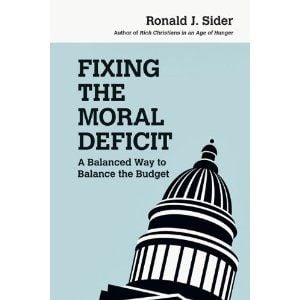(Part 1 of this review here, by proxy.)
At the end of Ronald J. Sider’s most recent book, Fixing the Moral Deficit: A Balanced Way to Balance the Budget, there’s an appendix of “Action Steps” for readers. The first of these reads as follows:
Read and reflect on a few dozen of the hundreds of biblical verses about God and the poor. Then prayerfully ask God to help you share God’s love for poor, hurting persons. If you need help finding the verses, see the two hundred pages of biblical text on the poor in Ronald J. Sider, For they Shall Be Fed: Scripture Readings and Prayers for a Just World (Nashville: Word, 1997) or just go through the dozens of verses in chapter three of Ronald J. Sider, Rich Christians in an Age of Hunger (Nashville: Thomas Nelson, 2005).
I second both of those recommendations. Rich Christians, in particular, is a powerful book, in which Sider presents a relentless argument for life-changing generosity.*
 In that book, originally published in 1977, Sider sets the stage with two long, insistent chapters, one laying out statistics on the scope, depth and impact of poverty around the world, and the other laying out the massive collection of biblical imperatives, laws, stories, histories, parables, proverbs, psalms and suggestions urging God’s children to give generously to those in need. Sider follows those chapters with the core of the book, the case for what he calls a “graduated tithe” — a way of structuring personal generosity to resist the creeping influence of affluence.
In that book, originally published in 1977, Sider sets the stage with two long, insistent chapters, one laying out statistics on the scope, depth and impact of poverty around the world, and the other laying out the massive collection of biblical imperatives, laws, stories, histories, parables, proverbs, psalms and suggestions urging God’s children to give generously to those in need. Sider follows those chapters with the core of the book, the case for what he calls a “graduated tithe” — a way of structuring personal generosity to resist the creeping influence of affluence.
Rich Christians also included a coda that included policy suggestions, but the main thrust of the book was Sider’s call for personal, voluntary, individual, private generosity.
So, predictably, the fledgling religious right recoiled and condemned the book as a Stalinist manifesto. Sider was called a Communist, a radical class warrior driven by the politics of envy.
Rich Christians became a best-seller, and the thousands of Christians who actually read it knew that those wild criticisms were baseless and ridiculous. But the critics were brutal and they had a bigger platform than Sider had — they had Christian radio, magazines and the direct mail outrage-machines of the religious right. The nasty intensity of that criticism meant that in the less-politicized “mainstream” evangelical press Sider and his book were categorized as “controversial” — the standard evangelical approach to marginalizing someone with an inconvenient message. People who hadn’t read the book had heard something or other about it — something bad. It was some kind of radical left-wing Contra thing or something, rumor had it. That’s what they’d heard, and they figured where there’s smoke, there must be fire.
Sider was stung by that criticism and the viciousness of the attacks. As an earnest, guileless Mennonite, he has always assumed the best of everyone, approaching even the cynical political operatives who attacked him and his book as though they were simply fellow Christians responding reasonably in good faith. So Sider set out to engage them in constructive dialogue.
One result of that dialogue — which has gone on now for more than three decades — is that the central contention of Rich Christians in an Age of Hunger is no longer instinctively condemned as “controversial.” Even on the furthest fringes of the Christian right, Sider’s contention about “God’s love for poor, hurting persons” is now accepted as something yesofcourse, everyone acknowledges as true. That’s an enormous achievement and a testimony to Sider’s patient determination over many years.
But the influence worked in both directions. The fierce attacks on Rich Christians made Ron Sider a more cautious writer. The voices of the external critics who battered him now seem to have been incorporated by his internal editor.
The policy agenda sketched at the end of the first edition of Rich Christians was a basic wish-list of the sorts of things anti-hunger advocates and development agencies were calling for in 1977. Each subsequent edition and revision of the book moved further away from that, incorporating more of a neoliberal outlook. When you read that first edition, you came away with the vivid sense of a writer who was passionately driven to help the neediest. That passion can still be found in the later revisions, and in the many books Sider has written since, but it’s less compelling and less contagious, muted by a palpable sense that every word has been weighed by someone trying to avoid being attacked again as a leftist commie.
That same dynamic seems to explain this new book from Sider. Harrumphing about deficit is a surefire way to establish one’s credentials as a serious and sensible moderate centrist. And in the current context — with America haltingly emerging from a global financial crisis and still mired in the greatest employment crisis since the Great Depression — that seems to be the primary reason for anyone to be discussing deficits instead of those things.
Fixing the Moral Deficit contains elements of Sider at his best — glimpses of why he can be an immensely challenging (in the best sense) and rewarding writer. It also contains a great deal of what can make his writing immensely frustrating.
Happily, this book neatly segregates those aspects. It thus yields two helpful and constructive sections. One revisits the central theme of Rich Christians and For They Shall Be Fed, summarizing the biblical case for helping the poor. The other makes a strong defense of government programs aimed at assisting the poor and helping the needy survive. Sider repeatedly insists that such programs must be protected from budget cuts that would hurt the needy they serve. Unfortunately, the overall trajectory of the book and the very fact of the book — its central contention that a balanced budget is an urgent moral imperative — contradicts and undermines Sider’s emphatic insistence on that point.
The remainder of Fixing argues that the federal budget must be balanced, but it doesn’t offer much in the way of a coherent approach to doing that. There are plenty of specific ideas, but little sense of how they might fit together — or recognition that several of them are contradictory.
The first hint of trouble comes before the first page. In a list of abbreviations used in the book, Sider includes “Simpson-Bowles” as shorthand for the “Report of the National Commission on Fiscal Responsibility and Reform,” which was chaired by Alan Simpson and Erskine Bowles. That commission never approved a report. The “Simpson-Bowles” report represents only the opinions of Simpson and Bowles.
It doesn’t get better once you discover why that two-man report is cited in later chapters of Sider’s book. It’s tossed into a pot with Rep. Paul Ryan’s austerity budget and a passing nod to President Obama’s plan, then stirred in the hopes that some reasonable compromise will emerge — since, after all, the truth must always be somewhere in the middle.
The book lacks a clear picture of what the federal government does or what it spends its budget on. The federal government, essentially, is an insurance company with an army. Everything else is just nibbling around the edges. And Fixing the Moral Deficit spends most of its energy nibbling around the edges.
In the short run, America is running large deficits because we’re still stuck in a glacial recovery from a crippling recession. Revenue is far below where it should be, and where it would be if we were back at full employment with robust economic growth. War also turns out to be really expensive — and two wars turns out to be twice as expensive. (Oddly, Sider — an outspoken pacifist — barely mentions the perpetual war machine of 21st century America as a factor in the federal deficit.) We’re also contending with the self-inflicted fiscal wound of the redistributive Bush tax-cuts, which are still — at least in theory — set to expire.
But in the long run, there’s really only one factor: the rising cost of health care.
That’s the core of America’s long-term budget worries: Medicare and Medicaid. Fix those two things — get health care costs under control — and we could screw up every other budgetary effort and still wind up OK. Fail to fix those two things and even if everything else is handled perfectly, we’d still be in trouble in the long run. Sider mentions Medicare and Medicaid, but he doesn’t put them at the center of this discussion, where they belong. (Nor does he dwell on the single largest effort to “bend the cost curve” of those programs, and the single largest deficit-reduction step taken since the Clinton administration: the Affordable Care Act.)
If you’re looking for the solution promised in the book’s subtitle — a “way to balance the budget” — you’ll be disappointed. You may find some useful nuggets here and there that suggest possible ingredients to such a “way.” Two paragraphs raise the possibility of a carbon tax as maybe, perhaps, something that might play a role. There’s a tentative call for something like a Tobin tax. But there’s no sense of how those ideas fit together into a larger plan, and little recognition of the kind of political difficulties that such proposals would face. (The politics of this book are mainly of the Green Lantern variety — where anything is possible if we just supply enough willpower.)
So again, let me refer you to that first action step from the book’s appendix:
Read and reflect on a few dozen of the hundreds of biblical verses about God and the poor. Then prayerfully ask God to help you share God’s love for poor, hurting persons. If you need help finding the verses, see the two hundred pages of biblical text on the poor in Ronald J. Sider, For they Shall Be Fed: Scripture Readings and Prayers for a Just World (Nashville: Word, 1997) or just go through the dozens of verses in chapter three of Ronald J. Sider, Rich Christians in an Age of Hunger (Nashville: Thomas Nelson, 2005).
I emphatically recommend that you do this. Get a hold of an early edition of Rich Christians — the brown one, if you find one, or the purple one. Read it and you’ll see why Ron Sider is someone I admire and respect greatly.
But if you want to understand America’s federal budget, or you’re interested in how it can be restored to balance in the long run, then, well, I’d recommend the bloggers cited in the previous post.
– – – – – – – – – – – –
* Full disclosure: I worked for Ron Sider throughout the 1990s at Evangelicals for Social Action and he was my adviser when I was a student at Palmer Seminary. He has been a friend, a mentor and a colleague, and I like, respect and admire him a great deal. I’ll let you decide whether that discounts or reinforces the discussion here.












